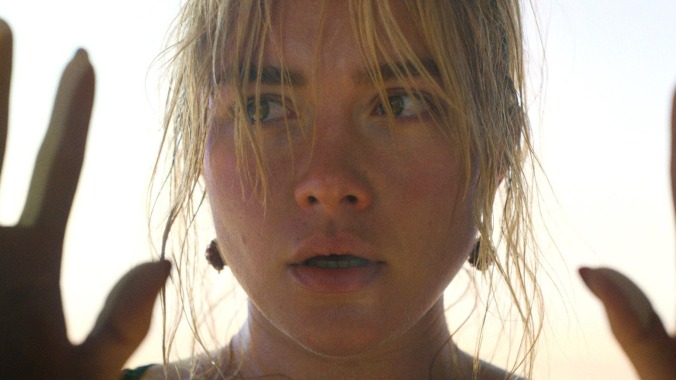In Don't Worry Darling, even a terrific Florence Pugh can't overcome the film's simplistic feminist messages
Olivia Wilde's heavily hyped follow-up to Booksmart is a predictable gaslighting thriller with an outmatched Harry Styles

At first glance, Olivia Wilde’s elementary gaslighting thriller Don’t Worry Darling is the kind of sci-fi-adjacent movie that warrants a red hot spoiler alert before you read anything about it. That much has been clear since the film’s trailer dropped, introducing audiences to the idyllic, ’50s-style “Victory Project” and its subject, a very Stepford Wives Florence Pugh. Partying with bottomless cocktails in one scene and crushing an empty egg with utter shock in the next, the clip’s growing unease indicated that viewers should prepare for a ride full of secrets and twists.
Although this critic initially fell for the promise of its Pleasantville-meets-The Truman Show premise, that enthusiasm dimmed sharply upon discovering that the film’s feminist lessons are as simplistic as its obvious plot turns. Written by Katie Silverman, Carey Van Dyke and Shane Van Dyke, Don’t Worry Darling might have passed as mildly provocative in the ’90s, before Truman opened the escape door or Neo took the red pill. But Wilde’s film grafts these ideas to a pedestrian, you-go-girl template that sadly feels all too basic. If this counts as a spoiler, blame it on the marketing.
At least Wilde’s visuals are striking to look at. That aggressive ’50s aesthetic (as thematically on-the-nose as it may be), full of faux-vintage furniture pieces, a charming color palette of mustards and pistachio greens, precious television sets and more, is lavish, alarming in its symmetry and spotlessness, thanks to knowingly un-lived-in work from ace production designer Katie Byron. As cloudless mountains surround a cul-de-sac where a row of pristine old-school cars sit, Wilde and her team paint a picture so perfectly manicured that it’s anyone’s guess whether you’re in an affluent Los Angeles suburb or Pleasantville itself. Hastily, an excessive number of heavy-handed needle-drops—from “Comin’ Home Baby” to “The Oogum Boogum Song”—escort us into straight-couple-dominated Victory, where plucky homemaker Alice (a fearlessly terrific Pugh) lives with her husband Jack (Harry Styles, who is no match for Pugh).
Alice kisses her husband goodbye every morning, does chores around the house, slips into a pretty tea-length dress every evening, and sets out a beautiful dinner timed to his return. But who cares about supper, when you can have voracious sex on the table and smash all that pretty china just for kicks? Alice and Jack indulge themselves as much as they fancy without concern for the neighboring couples, who appear to live just as blissfully (and with as many orgasms). There’s Bunny, (Wilde, sporting Rita Hayworth’s sculpted, Old Hollywood waves), Peg (Kate Berlant), and Margaret (KiKi Layne), the latter of whom suffers from a series of mental health episodes. There’s also Violet (Sydney Chandler), a doe-like newcomer learning the ropes who gamely follows suit when the rest chant, “We’re changing the world!” at social gatherings.